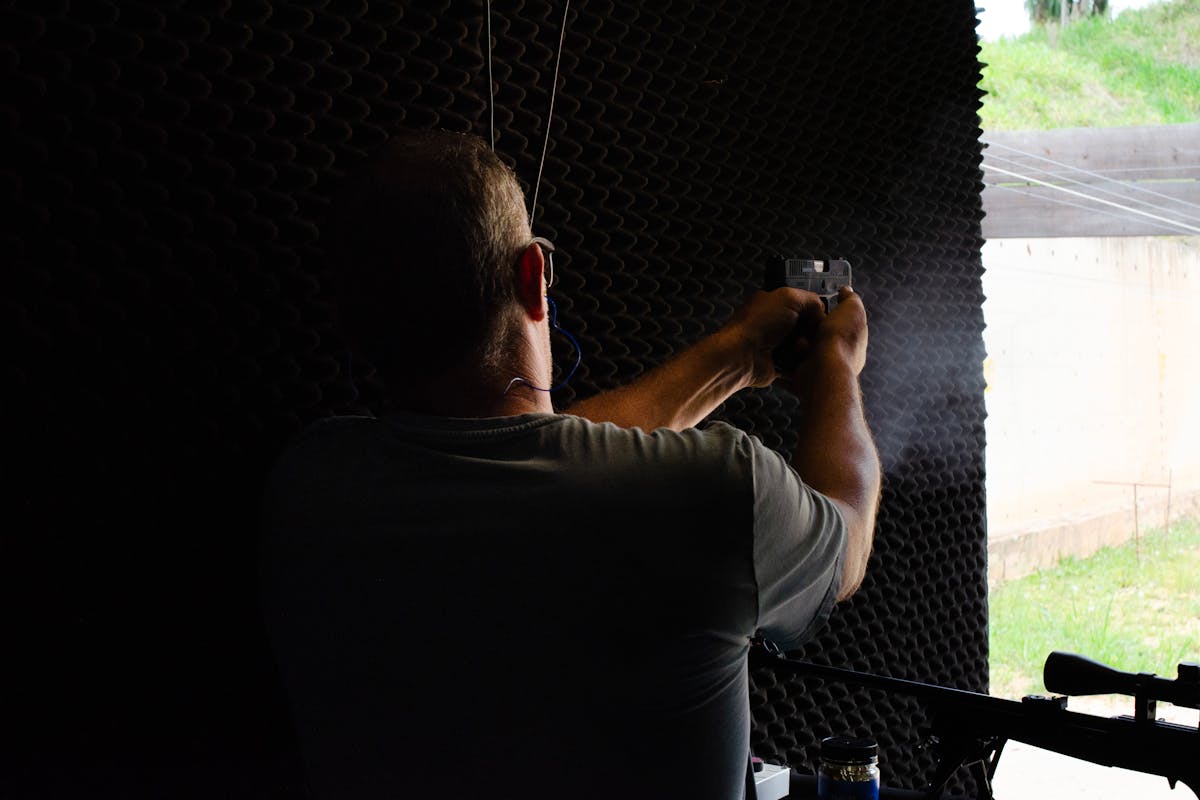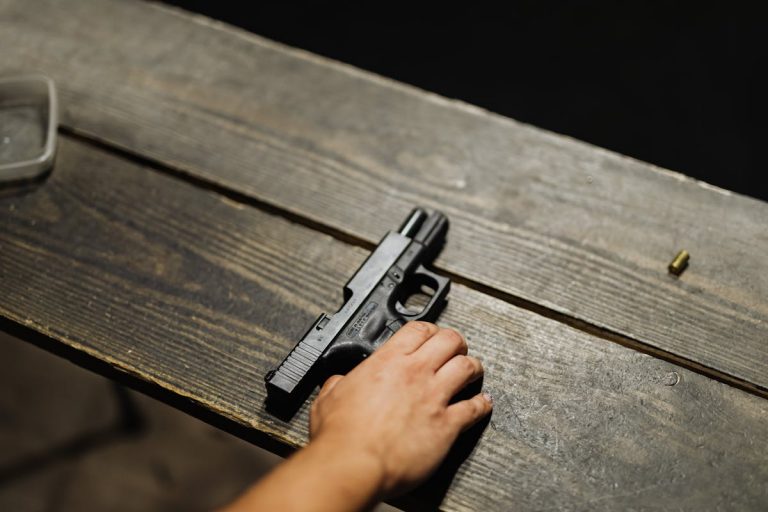The question of whether one can legally shoot an intruder in their home is a multifaceted issue that hinges on various factors such as local self-defense laws and the precise circumstances of the encounter. Many jurisdictions in the United States uphold the ‘Castle Doctrine,’ permitting homeowners to employ lethal force under certain conditions, without the obligation to retreat. However, an incorrect interpretation or application of these laws could result in serious legal repercussions. Consequently, it is essential to fully comprehend your rights within this context and to seek professional legal counsel when confronted with such a dilemma.
Understanding Self-Defense Laws
While it is essential to protect our homes and loved ones, understanding self-defense laws is paramount before taking any action. It is imperative to dispel self-defense myths and comprehend the legal terminology associated with these laws to guarantee you are acting within your rights.
Self-defense laws vary by state and are often shrouded in complex legal terminology, which can lead to misconceptions. One pervasive myth is the belief that you can freely shoot an intruder. In reality, most laws stipulate that lethal force is only justifiable when there is reasonable fear of imminent peril of death or serious bodily harm. Understanding these nuances is essential.
Moreover, many people mistakenly believe that a person must always retreat when threatened. However, not all jurisdictions require a duty to retreat, especially within one’s home. This misunderstanding underscores the importance of being informed about your local laws.
To that end, consider seeking legal advice to fully understand your rights and responsibilities under the law. Knowing what constitutes lawful self-defense can not only save lives but also prevent potential legal repercussions. Consequently, we must dispel self-defense myths and adequately equip ourselves with the correct knowledge.
Castle Doctrine Explained
Diving into the domain of self-defense laws, one encounters a significant concept known as the Castle Doctrine. This principal, rooted in centuries-old English Common Law, fundamentally asserts that your home is your castle, and you have the right to defend it against intrusion.
In the context of home invasion, the Castle Doctrine provides legal protection to homeowners who use force, even deadly force, to ward off intruders. It operates on the premise that individuals should feel safe in their own homes and should not be required to retreat or escape their own property under threat. It is essential to recognize that the application of the Castle Doctrine varies from state to state.
Some states have a “duty to retreat” clause, which mandates that a person must first try to escape the situation before resorting to deadly force. Other states, however, have a “stand your ground” policy, allowing the use of force without the obligation to retreat. Understanding the specifics of the Castle Doctrine in your locale is vital. This concept, while providing a degree of protection, should not be misconstrued as blanket permission to use force indiscriminately.
Stand Your Ground Laws
Stand Your Ground laws, an essential component of self-defense legislation, warrant our attention due to their far-reaching implications. These laws, varying greatly by state, can potentially protect homeowners who use lethal force when confronted with a perceived threat. However, their interpretation and application can lead to significant legal consequences, making an in-depth analysis of these laws vital for anyone considering invoking their rights under such laws.
Understanding Stand Your Ground
Frequently misunderstood yet highly influential in American self-defense laws, the Stand Your Ground laws demand an in-depth analysis. These laws fundamentally state that individuals have the right to use force, even deadly force, to protect themselves against an intruder in their home, without the duty to retreat.
One of the most prevalent self-defense myths suggests that one always has the duty to retreat when faced with a home invasion. However, Stand Your Ground laws contradict this myth, asserting the right of the individual to defend their domicile. A detail-oriented look at home invasion statistics reveals a shocking reality. The Bureau of Justice Statistics reports that in approximately 28% of home invasions, a household member was present. In 7% of all burglaries, a household member experienced some form of violent victimization.
In light of these statistics, the persuasive argument for Stand Your Ground laws becomes clear. They provide a legal framework for individuals to protect themselves in their own homes, a place where one has every right to feel safe. Understanding these laws is essential for homeowners and renters alike, to be prepared and legally protected in case of a home invasion.
Potential Legal Consequences
Beneath the umbrella of self-defense, Stand Your Ground laws can have profound legal consequences that demand our attention. These laws, while designed to protect homeowners, can potentially lead to criminal liability if misinterpreted or misapplied. The crux of the issue lies in determining whether the use of deadly force was truly necessary and reasonable under the circumstances.
In states with robust Stand Your Ground statutes, homeowners may not have a duty to retreat before using force. However, proving that the force used was reasonable and necessary can be challenging. If the court deems that the force was excessive or unwarranted, homeowners may face criminal charges ranging from assault to manslaughter or even murder.
Furthermore, the insurance implications of using lethal force in self-defense scenarios can be significant. Homeowners’ insurance policies may not cover legal defense costs or civil judgments associated with a shooting incident. This could leave homeowners financially exposed, even if they believed they were acting within their legal rights. A detailed understanding of Stand Your Ground laws and the potential legal consequences is vital for homeowners to navigate these complex scenarios.
Legal Consequences of Shooting an Intruder
In evaluating the legal repercussions of shooting an intruder, it is essential to understand that this is a complex and multifaceted issue. Legal outcomes can hinge on a myriad of factors including state laws, the circumstances of the intrusion, and whether or not the homeowner’s actions are deemed reasonable.
In many jurisdictions, homeowners are protected by laws that uphold their property rights. Yet, negligent discharges, where a firearm is unintentionally fired, can result in criminal charges, even if it was done in perceived self-defense. It is vital to reflect on the potential legal ramifications before resorting to lethal force.
Furthermore, the Castle Doctrine, applicable in some states, permits homeowners to use lethal force if they reasonably believe it necessary to prevent imminent death or significant bodily harm. However, this doctrine does not grant carte blanche permission to shoot intruders. The force used must align with the perceived threat.

Ethical Considerations in Self-Defense
The morality of self-defense, particularly in the context of home invasions, is a complex landscape fraught with ethical quandaries. It’s not merely about whether one can protect oneself, but also about the ethical implications invoked when one opts to use lethal force.
Moral dilemmas arise from the question: should the sanctity of life be upheld above the right to personal safety and property? Fundamentally, does the act of trespassing make forfeit the intruder’s right to life? These questions highlight the complex interplay of ethics, rights, and responsibilities within the domain of self-defense.
The decision to use deadly force in self-defense is not a simple binary choice, but rather a spectrum of ethical considerations. On one hand, there is the imperative to protect oneself and one’s family. On the other, there is the weight of taking another’s life, even in self-defense.
This discussion underscores the importance of thinking through the ethical implications of self-defense before finding oneself in a threatening situation. The decisions made in the heat of the moment can yield far-reaching consequences, both material and moral. In the end, the ethics of self-defense are as personal and unique as the individuals involved.
Home Security Alternatives
Countless alternatives to lethal force exist for securing one’s home, reflecting a broad spectrum of choices when it comes to personal safety. The advancement in technology and the availability of community resources have made these alternatives effective and accessible.
Among the options, home security systems stand out as all-encompassing solutions. They integrate surveillance cameras, home alarms, and motion sensors to provide 24/7 monitoring and alert homeowners of any intrusion. Personal safety devices, such as panic buttons or personal alarms, can also offer immediate assistance in emergencies.
To further enhance security, consider the following:
- Implementing security lighting: Proper exterior lighting can deter potential intruders by eliminating hiding spots.
- Joining a neighborhood watch: These community-led initiatives can provide additional eyes and ears to report suspicious activity.
- Installing surveillance cameras: Visible cameras can act as a deterrent, while hidden ones can provide evidence if a crime occurs.
- Leveraging community resources: Local law enforcement often provide home security assessments and tips.
With these alternatives, homeowners can achieve a sense of security without resorting to lethal force. It’s about choosing the right combination that suits individual needs and comfort levels.
Real Life Cases and Outcomes
Analyzing historical instances of self-defense, such as renowned cases where homeowners have confronted intruders, provides critical insights into the potential consequences and ethical implications of such actions. Simultaneously, it’s imperative to understand the legal repercussions that can stem from these scenarios, examining the complex interplay between personal safety and the law. Additionally, dissecting controversial cases of home intrusion can facilitate a more nuanced understanding of this intricate issue, thereby empowering homeowners to make informed decisions.
Famous Self-Defense Incidents
Drawing from a rich history of self-defense cases, several stand out for their significant impact on the public’s perception and the legal discourse surrounding home intrusions. These famous cases illustrate the varying outcomes of self-defense tactics employed by homeowners facing a direct threat.
- The Joe Horn shooting controversy: In 2007, Joe Horn, a Texas resident, shot and killed two men he saw breaking into his neighbor’s home. Despite the controversy, Horn was not indicted as the Grand Jury concluded he was within his rights under Texas law.
- The Tony Martin case: In the UK, Martin shot and killed a burglar in his home in 1999. He was initially convicted of murder, but this was later reduced to manslaughter.
- The Bernhard Goetz case: In 1984, Goetz shot four men on a New York subway, claiming they were trying to rob him. He was acquitted of attempted murder but convicted for carrying an unlicensed firearm.
- The Yoshihiro Hattori case: In 1992, Hattori, a Japanese exchange student in Louisiana, was shot and killed by a homeowner who mistook him for an intruder. The shooter was acquitted, sparking international outrage.
These cases highlight the complexity of self-defense laws and the factors influencing their interpretation in court.
Legal Consequences Explored
The legal labyrinth of self-defense cases, particularly those involving home intrusions, often results in varying outcomes, underscoring the importance of understanding the potential consequences. While self-defense justification can provide a solid legal defense, it is contingent upon the circumstances and the jurisdiction’s laws.
In some instances, homeowners have faced legal repercussions ranging from manslaughter to murder charges, while others have been acquitted citing self-defense. This disparity in legal outcomes highlights the delicate balance required in establishing self-defense justification. A key factor is the concept of ‘reasonable force.’ The law often scrutinizes whether the homeowner’s response was proportionate to the perceived threat.
Specific legal defenses like the Castle Doctrine and Stand Your Ground laws also play an essential role in such cases. These laws fundamentally state that individuals have no duty to retreat when their home is invaded, and can use force, even deadly, to protect themselves. However, these laws differ considerably across jurisdictions, reinforcing the need for homeowners to be aware of their local laws.
Controversial Home Intrusion Cases
High-profile cases of home intrusions have stirred contentious debates across the globe, underscoring the complexity of self-defense laws and their interpretations. Intruder profiling and home safety are central themes in these discussions, often complicating the delineation between justified self-defense and unlawful conduct.
Consider these controversial cases:
- The infamous Tony Martin case in the UK where a farmer shot and killed an intruder in 1999. Martin was initially convicted of murder, then later reduced to manslaughter due to diminished responsibility.
- The Trayvon Martin case in the US, wherein an unarmed teenager was shot by a neighborhood watch volunteer, causing a nationwide uproar and a revisiting of “Stand Your Ground” laws.
- In Japan, a homeowner was arrested for fatally stabbing a burglar in 2007, as the self-defense conducted was deemed excessive.
- In 2018, a Toronto homeowner was charged after shooting an intruder, demonstrating Canada’s strict approach to gun use, even in self-defense situations.
These cases demonstrate the global disparity in self-defense laws, with home safety considerations often being weighed against potential overreactions. It’s clear that striking a balance between protecting oneself and preventing unnecessary harm is a complex, global legal challenge.
Seeking Legal Advice After an Incident
Undeniably, a considerable number of homeowners find themselves entangled in legal complexities after a home defense incident. Despite the immediate relief of surviving a threatening situation, the aftermath can often be just as intimidating. One of the vital steps to navigate this labyrinth is seeking proficient legal advice.
A competent legal advisor can provide an analytical assessment of your case, considering state laws and the context of the incident. It is essential to understand that the concept of self-defense varies considerably across jurisdictions, and what might be acceptable in one state could be perceived as an excessive use of force in another. This is where victim rights come into play. Homeowners have the right to protect themselves, but determining the proportionality of the response is often the crux of the legal quandary.
Legal representation becomes the homeowner’s shield, guiding them through the ins and outs of the legal system, offering detail-oriented advice, advocating persuasively on their behalf. It is essential to ascertain that your rights as a victim are upheld, your actions are justified, and your future is secured. Consequently, procuring legal advice should be the immediate subsequent step after a home defense incident.
Frequently Asked Questions
What Type of Firearm Is Best for Home Defense?
The best firearm for home defense can vary based on personal preferences. Shotguns offer advantages in close-quarters scenarios with their spread pattern, while handguns provide versatility in handling, storage, and maneuverability within confined spaces.
How Can I Safely Store a Firearm in My Home?
Safely storing a firearm at home requires mindful practices. Using secure locks and firearm storage units is vital. Regular maintenance, proper handling, and secured storage away from children are important elements to guarantee home safety.
Do I Need a Permit to Own a Gun for Home Defense?
Yes, a permit is typically required for gun ownership, irrespective of its use for home defense. Understanding your local gun ownership laws is essential, as these regulations vary widely depending on your specific location.
How Can I Train Myself to Use a Firearm Effectively?
Effective firearm training involves a combination of theoretical knowledge and practical shooting drills. It requires professional instruction, regular practice, safety measures understanding, and mastering the technical aspects of your specific firearm for efficient and safe use.
Can I Shoot an Intruder if I Am a Tenant in a Rented Property?
As a tenant, your rights include protecting yourself under self-defense laws. However, the legality of shooting an intruder varies by jurisdiction. Consult local laws and a legal professional to understand your specific rights and responsibilities.


